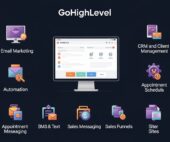Hey there! If you’re diving into the world of SEO, you’ve probably heard the term backlinks tossed around quite a bit. But what exactly are backlinks? Why are they so important? And how can you make sure the backlinks pointing to your website actually help your rankings instead of hurting them?
Don’t worry—I’ve got you covered. In this guide, we’ll break down everything you need to know about backlinks: their benefits, how to evaluate their quality, the role of spam scores and relevance, and how to use backlinks strategically to climb the ranks on Google and other search engines. Plus, I’ll share a list of high-authority websites where you can earn powerful backlinks to boost your site’s Domain Authority.
Ready to become a backlink pro? Let’s jump in!

What Are Backlinks?
Simply put, a backlink is a link from one website to another. Think of backlinks as “votes” of confidence—when other sites link to yours, they’re essentially telling search engines, “Hey, this content is valuable and trustworthy!”
Backlinks are a crucial part of Google’s ranking algorithm because they help determine your website’s authority and relevance. More quality backlinks generally mean higher rankings and more organic traffic.
Why Are Backlinks Important?
You might be wondering, “Why should I focus on backlinks instead of just creating good content?” Great question! While content is king, backlinks are the crown jewels. Here’s why:

1. Improve Search Engine Rankings
Google views backlinks as endorsements. The more authoritative and relevant backlinks you have, the better your chances of ranking higher in search results.
2. Increase Referral Traffic
Backlinks don’t just help SEO—they also bring real visitors from other sites. A well-placed backlink on a popular site can drive tons of targeted traffic.
3. Build Domain Authority (DA)
Domain Authority is a metric that predicts how well a website will rank. High-quality backlinks from authoritative websites raise your DA, which positively impacts rankings.
4. Enhance Brand Visibility & Credibility
When respected websites link to your site, it boosts your brand’s credibility and reputation in your industry.
Backlinks: Quality vs Quantity
Not all backlinks are created equal. In fact, quality matters way more than quantity when it comes to backlinks. Here’s what to look for:

1. Relevance
A backlink from a site related to your niche or industry is far more valuable than a random link from an unrelated website. For example, a backlink from a reputable tech blog will help your tech site more than a link from a cooking blog.
2. Authority
Links from high Domain Authority (DA) websites carry more weight. You want backlinks from trusted, well-established sites like Forbes, Moz, or Wikipedia rather than low-DA spammy sites.
3. Spam Score
Watch out for backlinks from sites with a high spam score (usually above 30%). These links can harm your rankings and may cause penalties.
4. Anchor Text
The clickable text in the backlink should be relevant to your content. Avoid over-optimized exact-match keywords as anchor text—it can look spammy to search engines.
5. Follow vs Nofollow
“Follow” backlinks pass SEO value, while “nofollow” links do not. A natural backlink profile includes both, but focus on getting quality “follow” backlinks.
Evaluate Your Backlinks
To monitor your backlinks’ quality, use tools like:
- Ahrefs
- Moz Link Explorer
- SEMrush
- Majestic SEO
These platforms help you analyze backlinks for DA, relevance, spam score, and anchor text distribution.
How Backlinks Boost Search Rankings
Backlinks are one of the top ranking factors in Google’s algorithm. Here’s how they influence your SEO:

- Trust & Authority: Google trusts sites that have quality backlinks because it signals the content is valuable.
- Content Relevance: Relevant backlinks show your content matches user intent.
- Improved Crawlability: Backlinks help Google bots discover your pages faster.
- Competitive Edge: If your competitors have strong backlink profiles, building better backlinks helps you compete effectively.
Common Backlink Strategies
Here are some proven ways to build high-quality backlinks:

1. Guest Posting
Write articles for reputable blogs in your niche and include links back to your site.
2. Resource Pages
Get your site listed on resource pages or directories relevant to your industry.
3. Broken Link Building
Find broken links on other sites and suggest your content as a replacement.
4. Skyscraper Technique
Create better content than existing popular posts and reach out to sites linking to those posts.
5. Social Sharing & PR
Share your content widely on social media and pitch stories to journalists and bloggers.
Beware of Spammy Backlinks & Negative SEO
Not all backlinks help—some can hurt your site:

- Low-quality links from link farms or spammy directories
- Paid links without proper disclosure
- Links from irrelevant or shady websites
Google may penalize sites with unnatural backlink profiles, so it’s important to regularly audit your backlinks and disavow harmful links.
High Authority Websites for Powerful Backlinks
Here’s a curated list of high Domain Authority websites where you can aim to get backlinks to boost your site’s authority:

- Wikipedia (DA 100)
- Blogger (DA 100)
- Medium Post (DA 95)
- Pintrest (DA 94)
- Google Site (DA 96)
- Drupal (DA 91)
- Fool (DA 91)
- Rediff (DA 91)
- StackExchange (DA 91)
- AlphaCoders (DA 90)
- ForumsBestbuy (DA 90)
- LiveStream (DA 90)
- Slack (DA 90)
- Xfinity (DA 90)
- Yumpu (DA 90)
- GetPocket (DA 90)
- BleachErreport (DA 90)
- SeekingAlpha (DA 90)
- SBnation (DA 90)
- Zillow (DA 90)
- BbsBoingboing (DA 90)
- Moodle (DA 90)
- Diigo (DA 90)
- ProductHunt (DA 90)
- SimpleSite (DA 90)
Building backlinks from these sites may take effort but can significantly improve your site’s Domain Authority and ranking potential. If you need professional backlink services to boost your website with high authority links, contact us today.
Conclusion
Backlinks remain a cornerstone of effective SEO. When done right—focusing on quality, relevance, and authority—they can dramatically boost your website’s visibility, credibility, and organic traffic. Regularly monitor your backlink profile to avoid spam and leverage high-authority sites for maximum impact.
Remember, SEO is a marathon, not a sprint. Keep building genuine relationships, create valuable content, and watch your rankings soar!





